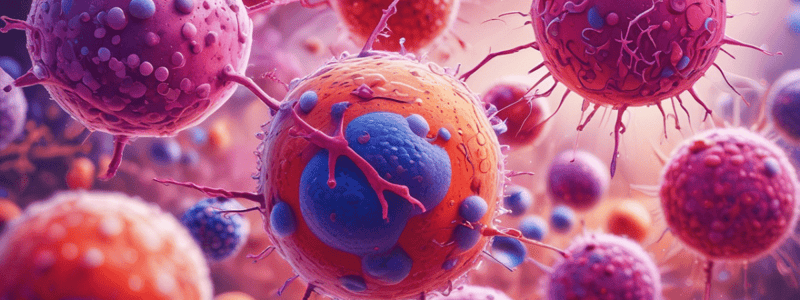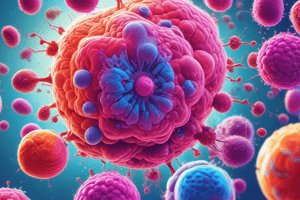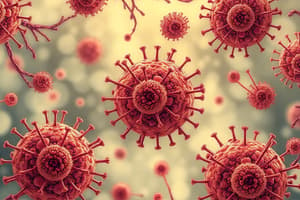Podcast
Questions and Answers
Where can rapidly dividing B cells and plasma cells be found?
Where can rapidly dividing B cells and plasma cells be found?
- Spleen
- Lymphoid nodules
- Tonsils
- Lymph Nodes (correct)
Which organ holds many dendritic cells and macrophages and is known as the 'filter of the Blood'?
Which organ holds many dendritic cells and macrophages and is known as the 'filter of the Blood'?
- Lymph Nodes
- Lymphoid nodules
- Tonsils
- Spleen (correct)
What is the function of mucosa-associated lymphoid tissue (MALT) in the human body?
What is the function of mucosa-associated lymphoid tissue (MALT) in the human body?
- Developing immunity to oral pathogens (correct)
- Filtering blood
- Transporting hormones
- Aiding in digestion
What causes the swelling of tonsils?
What causes the swelling of tonsils?
Where are lymphoid nodules typically found in the human body?
Where are lymphoid nodules typically found in the human body?
Which vessels enter the lymph node?
Which vessels enter the lymph node?
What is the primary function of helper T cells?
What is the primary function of helper T cells?
Which type of T cell is responsible for directly killing infected or cancerous cells?
Which type of T cell is responsible for directly killing infected or cancerous cells?
What is the primary function of B cells?
What is the primary function of B cells?
What is the role of IgA antibodies in the immune response?
What is the role of IgA antibodies in the immune response?
What is the key difference between active and passive immunity?
What is the key difference between active and passive immunity?
What is the primary function of regulatory T cells in the immune system?
What is the primary function of regulatory T cells in the immune system?
What is the purpose of the negative selection process during T cell development in the thymus?
What is the purpose of the negative selection process during T cell development in the thymus?
What is the primary mechanism by which cytotoxic T cells kill target cells?
What is the primary mechanism by which cytotoxic T cells kill target cells?
What is the primary function of the clonal expansion process in the adaptive immune response?
What is the primary function of the clonal expansion process in the adaptive immune response?
What is the purpose of the positive selection process during T cell development in the thymus?
What is the purpose of the positive selection process during T cell development in the thymus?
What is the primary reason why an HIV vaccine has been difficult to develop?
What is the primary reason why an HIV vaccine has been difficult to develop?
In a type 1 hypersensitivity reaction, what is the primary mechanism?
In a type 1 hypersensitivity reaction, what is the primary mechanism?
In autoimmune diseases, what is the primary mechanism?
In autoimmune diseases, what is the primary mechanism?
Which of the following statements about organ transplantation is true?
Which of the following statements about organ transplantation is true?
What is the role of the immune system in cancer?
What is the role of the immune system in cancer?
Which of the following statements about autoimmune diseases is true?
Which of the following statements about autoimmune diseases is true?
Why is an antibody ineffective against a virus inside a cell?
Why is an antibody ineffective against a virus inside a cell?
Which of the following is NOT a mechanism used by pathogens to evade the immune response?
Which of the following is NOT a mechanism used by pathogens to evade the immune response?
What is the primary cause of the high mutation rate in influenza viruses?
What is the primary cause of the high mutation rate in influenza viruses?
Which of the following is an inherited immunodeficiency disorder?
Which of the following is an inherited immunodeficiency disorder?
What was the treatment for the "boy in the bubble" who had SCID?
What was the treatment for the "boy in the bubble" who had SCID?
What is seroconversion in the context of HIV/AIDS?
What is seroconversion in the context of HIV/AIDS?
Which of the following is true about B cells?
Which of the following is true about B cells?
What is the primary function of plasma cells?
What is the primary function of plasma cells?
Where do T cells mature?
Where do T cells mature?
Which of the following is NOT a secondary lymphoid organ?
Which of the following is NOT a secondary lymphoid organ?
What is the primary function of Natural Killer (NK) cells?
What is the primary function of Natural Killer (NK) cells?
Flashcards are hidden until you start studying



